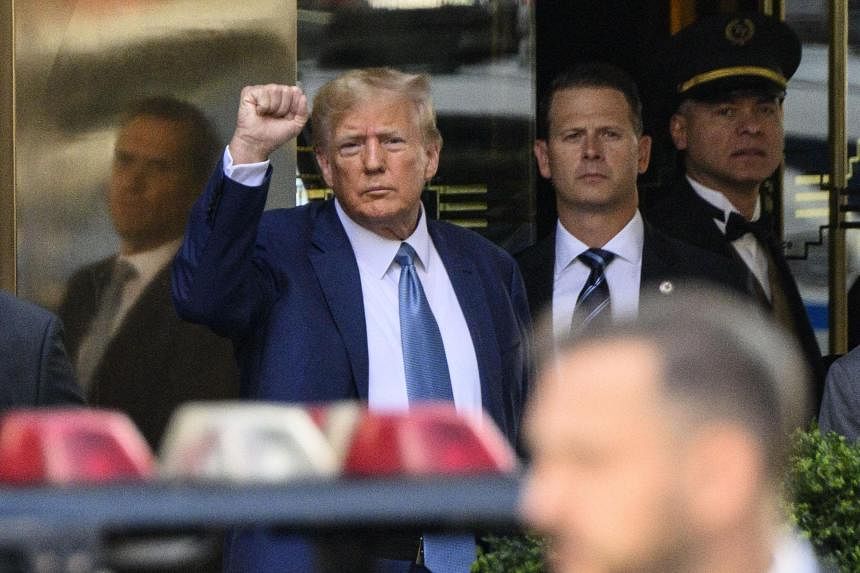WASHINGTON - Former US president Donald Trump is under multiple indictments, the third and latest coming on Tuesday, and potentially faces even more. Yet, he remains the clear front runner for the Republican presidential nomination, pulling in more than 50 per cent support in national primary polls – more than all his competitors combined.
That presents the Republican Party with an intensifying dilemma over whether to nominate him as its candidate for the 2024 presidential election.
If it goes by poll numbers, the party has little choice: Trump remains well ahead of Florida Governor Ron DeSantis, his top challenger. According to an average of polls maintained by the political analytics website FiveThirtyEight, as at Tuesday, Trump was polling 53.4 per cent to Mr DeSantis’ 15.6 per cent.
Yet – and here lies the catch – Trump’s base alone is not big enough to win the general election.
“To Trump’s supporters, these indictments and legal troubles are proof that a ‘Deep State’ exists and is after not only him, but them, too,” New York-based Republican strategist Evan Siegfried told The Straits Times.
“To them, Trump is their champion who is being attacked because he ‘fights for them’. He’s in a very strong position to win the GOP (Grand Old Party) nomination,” he said, referring to the party’s nickname. “But when it comes to the general election, his base cannot deliver the 270 electoral votes needed to return to the White House.”
The Eurasia Group wrote in an e-mail that, politically, the effect of the latest charges will be limited.
“But recent developments lead us to increase the odds that Trump is the Republican nominee from 65 per cent to 75 per cent,” Eurasia Group analysts Noah Daponte-Smith and Jon Lieber wrote.
“Trump remains the clear front runner in all polls, with no close rivals.”
They also noted that the former president had received a polling boost from a previous indictment in Manhattan on business fraud charges, and did not suffer any loss after a federal indictment for mishandling classified documents. Both previous indictments even delivered fund-raising boosts.
“On balance, the package of indictments will benefit Trump in the primary by allowing him to cast himself as the victim of a political witch-hunt and by taking up valuable media space that his opponents will be unable to occupy,” they wrote.
“Each indictment forces other contenders in the primary to come to Trump’s defence, lest they alienate the substantial portion of Republican voters who are firmly committed to his candidacy.”
Professor Charles Zelden, historian and political scientist at Nova Southeastern University in Florida, told ST that those who would vote for Trump in the primaries – which commence in January 2024 – are “locked in”.
“It’s clear they have made up their minds, but they aren’t enough for him to win the general election,” he said.
The steady stream of indictments could have an impact on independents, and Republicans who are not Trump supporters, Prof Zelden said.
If the Republican Party decides that it cannot nominate Trump, he could potentially “immediately turn around and run as an independent candidate, and Republicans would lose anyway”, he said. “So I think they’re just going to sit quiet and let him run and pray that he can get enough to win.”
Prof Zelden added: “Basically, they are caught in a Catch-22 – their chances of winning with Trump are low, but their chances of winning without Trump are lower.”
Trump’s opponents for the Republican nomination are in the same fix, he said.
To win, they must beat Trump, but to attack Trump is to not win.
Reacting to the latest indictment, Mr Mike Pence, Trump’s former vice-president, wrote on social media: “Today’s indictment serves as an important reminder: Anyone who puts himself over the Constitution should never be president of the United States.”
But Mr Pence is polling at only 4.4 per cent in FiveThirtyEight’s average of polls on candidates for the Republican nomination.
A further unknown is the timing of the trials. At least in the latest indictments, prosecutors are going to push for speedy legal proceedings.
In a brief, two-minute statement in Washington after the federal grand jury’s indictment, Special Counsel Jack Smith said he would seek a speedy trial.
But realistically, analysts say, the odds are that the legal process will be drawn out till late in the election cycle, or even after.
Prof Zelden said that the US is not in a good place.
“There are going to be people who will, to their dying day, believe that he (Trump) was being railroaded,” he said.
Democratic Congressman Adam Schiff posted on X, the platform formerly known as Twitter: “This will put our democracy to a new test: Can the rule of law be enforced against a former president and current candidate?
“For the sake of our democracy, that answer must be yes.”
Prof Zelden said: “We are a nation at war with itself. It happens to the best of countries. The question is, how do you handle it?
“There are institutional checks and balances that should help, but ultimately, it comes down to what people believe – and if people are unwilling to accept political outcomes, all the institutional checks are meaningless.”


